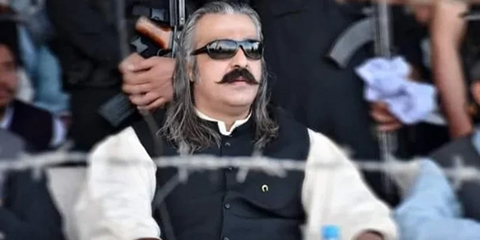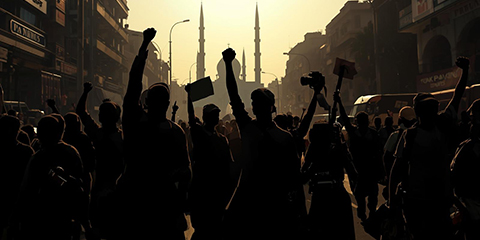'Gharidah Farooqi, it’s you!': Gandapur names and shames TV anchor
JournalismPakistan.com | Published last year | JP Staff Report
Join our WhatsApp channel
ISLAMABAD-Khyber Pakhtunkhwa Chief Minister Ali Amin Gandapur has again gone after journalists. Almost a week after his derogatory remarks labeling them as "sellouts" and targeting an unnamed female television anchor, Gandapur has now escalated the situation by explicitly naming the journalist in question—Gharidah Farooqi—during another public address.
In his latest speech, Gandapur directly addressed the earlier outcry from journalists, stating, “Gharidah Farooqi, it is you. I am naming you. You were creating such a hue and cry. You are among those who take money to make political narratives. I will keep naming other journalists too.”
By naming a prominent female journalist, Gandapur has only intensified the backlash, which will surely prompt an outpouring of criticism from journalist bodies, civil society organizations, and media watchdogs.
Journalists were already up in arms after Gandapur's initial remarks during a PTI rally in Islamabad on September 8, where he accused media professionals of taking bribes to promote specific narratives. His latest comments, specifically targeting Gharidah Farooqi, have set the stage for further conflict.
Media Protest: Mics Removed, Boycott Trend on X
In response to Gandapur’s persistent attack, journalists on Friday removed their microphones from a PTI press conference, demanding an apology from Gandapur. This move was quickly followed by a social media storm, with the hashtag #BoycottMainStreamMedia trending on X (formerly Twitter), amassing over 32000 posts. The trend, largely supported by PTI’s digital media team, called for the boycott of television channels that "spread biased narratives."
The media’s protests, while justified in standing up to Gandapur’s rhetoric, have raised questions about the objectivity of Pakistan’s press. Are the media outlets genuinely defending their profession, or is there truth to PTI's claims of bias in favor of the government?
The Larger Issue: Is the Media Biased?
The PTI and its supporters argue that the mainstream media in Pakistan is biased against the party, particularly its chairman, Imran Khan. Many channels, in a clear departure from journalistic standards, refrain from even mentioning Imran Khan by name, referring to him only as "PTI’s founder." The PTI leadership believes this media blackout is politically motivated and reflects the broader control the government and its allies have over the press.
The controversy surrounding Gandapur and the media also highlights a deeper problem—the growing divide between political factions and the press in Pakistan. The role of the media is to report the truth, hold power accountable, and provide balanced coverage. However, it is increasingly clear that the media landscape has been compromised by political influences, forcing many journalists to walk a tightrope between truthful reporting and the agendas of powerful stakeholders.
Gandapur's Rhetoric vs. Media's Response: Where Does it Go from Here?
While Gandapur's comments have been widely condemned, the media's role in covering PTI has not been without criticism. The ongoing friction between PTI and the press reflects a broader issue of trust—both sides feel marginalized. PTI supporters accuse the media of promoting the government's narrative while silencing the opposition, while journalists feel increasingly unsafe, pressured, and targeted by politicians like Gandapur who use the press as a punching bag.
As the situation escalates, one thing is clear: the crisis in Pakistan's media is far from over. The call for boycotts and Gandapur's unapologetic stance will likely continue to deepen divisions, not only between the media and PTI but also within the media industry itself. For Pakistan's democracy to function effectively, there must be space for independent, unbiased journalism. Without it, both politicians and the public will continue to suffer from the distortions of truth that plague the country’s news outlets.
It's high time that both the media and politicians step back and reflect on their responsibilities. The press should focus on delivering impartial, fact-based reporting, and politicians must respect the role of journalists, not use them as tools in political battles.
The Way Forward
With the media demanding an apology and Gandapur refusing to back down, the situation remains volatile. This is not just a battle between a politician and the press—it's a reflection of a much larger struggle for the soul of Pakistan's media landscape. If Pakistan is to retain any semblance of press freedom and democratic integrity, there must be an end to both biased reporting and reckless attacks on journalists.
As the public turns more to social media platforms like X for real-time news and analysis, mainstream media must recognize its role in shaping narratives fairly and objectively, while politicians like Gandapur must cease targeting the press for political gain.
Photo: gnnhd.tv

























